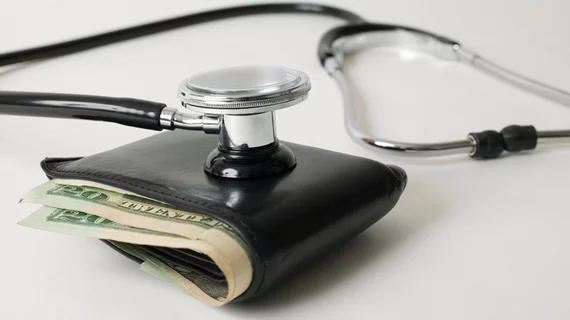One-third of healthcare payments tied to alternative payment models
The shift toward value-based care is moving forward, as more than one-third of all U.S. healthcare payments in 2017 were tied to alternative payment models like shared savings and risk programs, bundled payments and population-based payments, according to Health Care Payment Learning & Action Network (LAN).
However, the amount is short of the 50 percent goal set for 2018 by LAN, a public-private partnership established to accelerate the transition to a healthcare system that pays for quality over fee-for-service.
Driving value
Almost 34 percent of healthcare payments were tied to APMs in 2017. A quarter of healthcare dollars were fee-for-service with a link to quality and value incentives, like care coordination fees or pay-for-performance, and 41 percent of payments were strictly fee-for-service, according to the report.
While progress is being made, there is still a long way to go to replace a volume-based, fee-for-service system. Less than half of physicians (43 percent) said they receive at least some of their pay from value-based care in a recent survey from physician search firm The Medicus Firm.
“Our healthcare spending is growing faster than our overall economy and by 2026, 1 in 5 dollars spent in the United States will be spent on healthcare,” CMS Administrator Seema Verma said in a statement. “This is simply unsustainable, and we must change this trajectory. CMS values our partnerships with those on the frontlines of our healthcare system, and we continue to work with innovators to develop new ways to pay for and deliver care that focuses on patients.”
APM specifics
Medicare Advantage, which covers about one-third of all Medicare beneficiaries, appears to be driving much of the overall adoption of value-based payments. MA had almost half of healthcare dollars in alternative payment models, including shared savings, bundled and shared risk, and population-based models, according to the report.
In addition to more payments in value-based care models, fee-for-service (FFS) payment dropped in 2017 from the previous two years. More health plans are negotiating contracts that compensate providers with some type of quality measurement. In addition, 90 percent of health plans believe APM adoption will rise over the next two years, according to the report. More providers are also participating in accountable care organizations.
“The report’s findings reinforce our understanding that there is sustained, positive momentum in the effort to shift health care payments from traditional fee-for-service into value-based payments,” Mark McClellan, co-chair of the LAN Guiding Committee and director of the Robert J. Margolis Center for Health Policy, said in a statement. “While we celebrate the increase in overall APM adoption, we also know further progress on payment reform will be important to ensure health care dollars flow through models that have more risk.”
The report measured 78 health plans and three FFS Medicaid states and Medicare FFS, representing 84 percent of the national market and 245.4 million lives.

